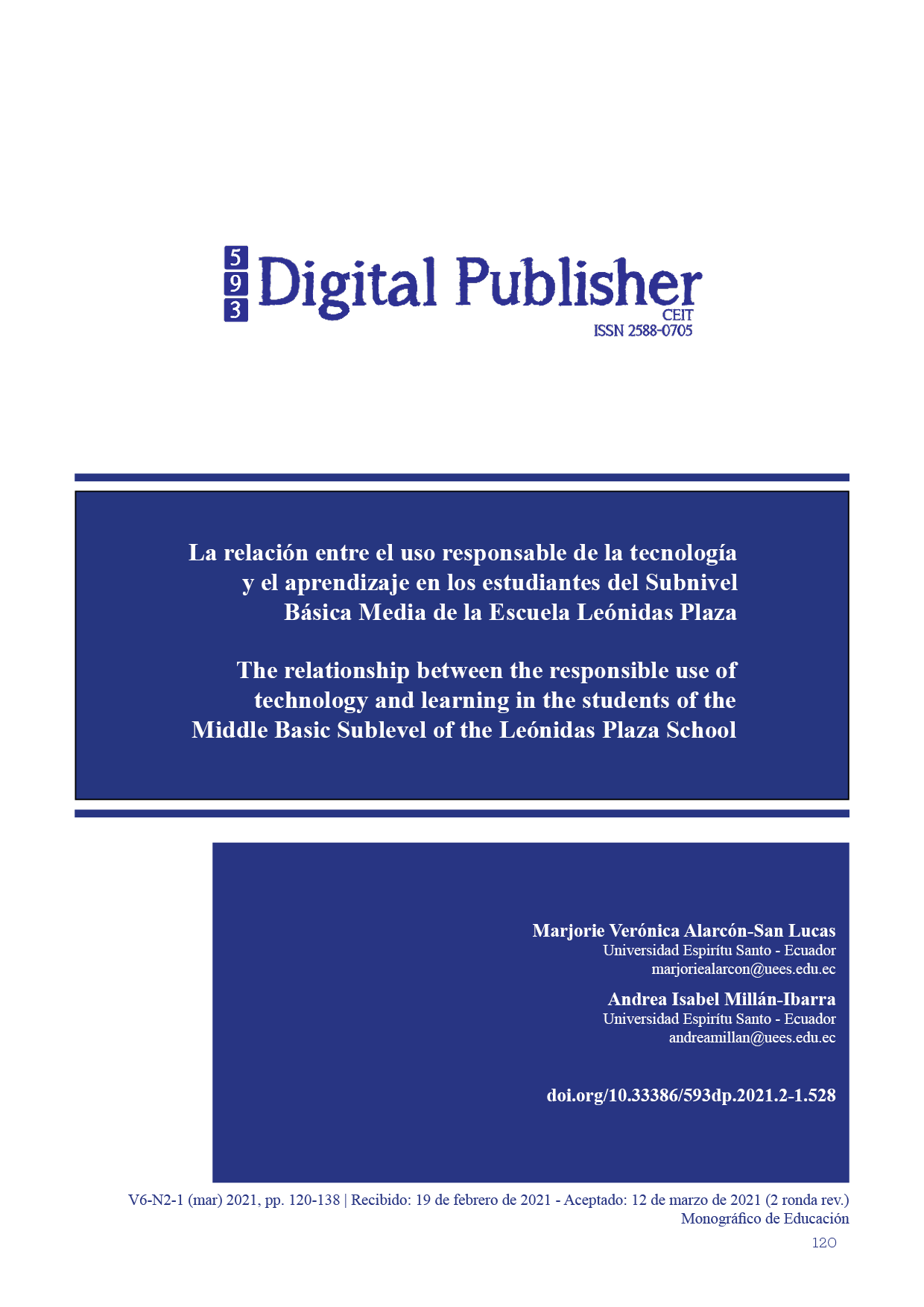The relationship between the responsible use of technology and learning in the students of the Middle Basic Sublevel of the Leónidas Plaza School
Main Article Content
Abstract
The student and the teacher are in a society of constant changes, where the educator is no longer a simple speaker, but a mediator of the teaching and learning process; In this way, you will know the capacities and aptitudes of the students, who must learn to convert the information acquired into knowledge. Technological resources allow incorporating information into educational processes; However, the teacher has the obligation to handle these applications and tools, to provide a better education, without neglecting the dangers and distractions that can be found when working with technology, since current education poses transcendental challenges in the education of the present and future generations.
This article aims to address the inappropriate use of technology by students, which impairs their meaningful learning. As a general objective, we propose to provide innovative strategies that allow full learning in the students of the Middle Basic Sublevel of the Leonidas Plaza School. The following research article has a mixed approach and thus the following theoretical and empirical methods are highlighted in this study: historical - logical, induction and deduction, hypothetical - deductive, experimentation, expert judgment, and retrospection. In this way, it can be concluded that the relationship between technology and learning plays an important role in any educational system, because technology provides beneficial changes in the different educational practices, where teachers must become reflective and critical awareness with the students. current educational processes and changes, implementing new teaching and learning tools, avoiding distractions for students in the educational teaching process.
Downloads
Article Details

This work is licensed under a Creative Commons Attribution-NonCommercial-ShareAlike 4.0 International License.
1. Derechos de autor
Las obras que se publican en 593 Digital Publisher CEIT están sujetas a los siguientes términos:
1.1. 593 Digital Publisher CEIT, conserva los derechos patrimoniales (copyright) de las obras publicadas, favorece y permite la reutilización de las mismas bajo la licencia Licencia Creative Commons 4.0 de Reconocimiento-NoComercial-CompartirIgual 4.0, por lo cual se pueden copiar, usar, difundir, transmitir y exponer públicamente, siempre que:
1.1.a. Se cite la autoría y fuente original de su publicación (revista, editorial, URL).
1.1.b. No se usen para fines comerciales u onerosos.
1.1.c. Se mencione la existencia y especificaciones de esta licencia de uso.
References
Aguilera, C. (2017). El modelo flipped classroom. Infad, 4(1), 261-266.
Burgos, C., Rodríguez Jerez, S., Piñeros Veloza, I., & Moreno Melo, C. (2018). Sobre el uso de la técnica y tecnología en la educación. Las TIC, la innovación en el aula y sus impactos en la educación superior, 13-34.
Cardozo, G. (2017). Ciberbullying. Revista Mexicana de psicología, 34(2), 101-109.
Cavazos Salazar, R., & Torres Flores, S. (2016). Diagnóstico del uso de las tecnologías en el proceso de enseñanza y aprendizaje en la educación superior. Revista Iberoamericana para la Investigación y el Desarrollo, 7(13), 273-292.
Cifuentes, L., & Jiménez, F. (2018). Políticas de aprendizaje móvil en el ámbito colombiano. Revista Boletín Redipe, 7(3), 90-97.
Diaz, V., & Calzadilla, A. (2016). Artículos científicos, tipos de investigación y productividad científica. Revista Ciencias de la Salud, 14(1), 115-121.
Espinal, R. (2018). Uso de las tecnologías en la educación. Atlante. Cuadernos de Educación y Desarrollo .
Estrada, M. (2016). El Aprendizaje Cooperativo y las Habilidades Socio-Emocionales. Formación Universitaria, 9(6), 43-61.
Ferreira, R., & DeNapoli, A. J. (2018). Un concepto clave para aplicar exitosamente las tecnologías de la educación: los nuevos ambientes de aprendizaje. Revista Panamericana de Pedagogía. Saberes y quehaceres del pedagogo.(8), 121-154.
Francesc, E. (2016). La competencia digital de los futuros docentes. Perspectiva educacional, 55(2), 38-54.
Gámez, F., Rodríguez, M., & Torres, L. (2018). Uso y aplicación de las TIC en el proceso de enseñanza - aprendizaje. Revista Científica de FAREM-Estelí, 7(25), 16-30.
García, A. (2017). Aprendizaje Basado en Proyectos (ABP). Revista Rie, 35(1), 113-131.
García, F., Fonseca, G., & Concha, L. (2015). Aprendizaje y rendimiento académico. Revista Electrónica “Actualidades Investigativas en Educación”, 15(3), 1-26.
García, S. (2017). Alfabetización Digital. Razón y palabra, 21(98), 66-81.
Gisbert, M., & Johnson, L. (2015). Education and technology: new learning environments from a transformative perspective. RUSC. Universities and Knowledge Society Journal, 12(2), 1-14. doi:http://dx.doi.org/10.7238/rusc.v12i2.2570
Gómez-Hurtado, I., García Prieto, F., & Delgado-García, M. (2018). Uso de la red social Facebook como Herramienta de aprendizaje en estudiantes Universitarios: estudio integrado sobre Percepciones. Perspectiva Educacional, 57(1), 99-119.
Jharinton, W. (2018). Uso seguro y responsable de las TIC. Ciencia, Docencia y Tecnología, 29(57), 1-26.
Llorente, J., Giraldo, I., & Toro, S. (2016). Análisis del uso de las tecnologías TIC por parte de los docentes de las Instituciones educativas de la ciudad de Riohacha. Omnia, 22(2), 50-64.
Loveless, A., & Williamson, B. (2017). Nuevas identidades de aprendizaje en la era digital. Madrid: Narcea, S.A. de Ediciones.
McKnight, K., O Malley, K., & Horsley, M. (2016). Teaching in a Digital Age: How Educators Use Technology to Improve Student Learning. Journal of Research on Technology in Education, 48(3), 194-211. doi:https://doi.org/10.1080/15391523.2016.1175856
Morales Piñero, J., & Rodríguez Jerez, S. (2018). Las TIC, la innovación en el aula y sus impactos en la educación superior. Bogotá: Universidad Sergio Arboleda.
Moreno, H. (2016). Incorporación de las TIC en las prácticas educativas. Reencuentro, 2(72), 71-92.
Pacheco, E., & Blanco, M. (2015). Metodología mixta: su aplicación en México en el campo de la demografía. Revista Estudios Demográficos y Urbanos, 30(3), 725-770.
Rodríguez Piguave, E. (2017). Análisis del uso de la telefonía móvil y su relación con el desarrollo cultural y social en jóvenes del Cantón La Libertad, Provincia de Santa Elena en el año 2016-2017. Doctoral dissertation - Universidad de Guayaquil.
Rojas, D., Jiménez-Fernández, S., & Rodríguez, R. (2018). Gestión del tiempo y uso de las TIC en estudiantes universitarios. Píxel-Bit. Revista de Medios y Educación(53), 109-121.
Rojas, M. (2015). Tipos de Investigación científica: Una simplificación de la complicada incoherente nomenclatura y clasificación. REDVET, 16(1), 1-14.
Santiesteban, P. (2017). Estrategias de persuasión en grooming online de menores. Psychosocial Intervention, 26(3), 139-146.
Sarango Aguirre, J., & Quishpe Gaibor, J. (Septiembre de 2018). Aplicación de la ética en el uso de la tecnología para la educación. Revista Caribeña de Ciencias Sociales.
Shum, M., Chum, L., & Yan, T. (2016). Enhancing learners’ self-directed use of technology for language learning: the effectiveness of an online training platform. Computer Assisted Language Learning, 29(1), 40-60. doi:https://doi.org/10.1080/09588221.2014.889714
Sierra, M. (2019). Gamificando el aula universitaria. REXE. Revista de Estudios y Experiencias en Educación, 18(36), 105-115.
Sigüenza, J. (2019). Nativos digitales y brecha digital: Una visión comparativa en el uso de las TIC . Revista de la Asociación Española de Investigación de la Comunicación, 6(11), 203-223.
Soto, M. A. (2017). El uso de la tecnología educativa en el proceso de enseñanza-aprendizaje en Ecuador. Opuntia Brava, 9(1), 125-132.
Suárez, W. (2019). El uso pedagógico de las tecnologías de la información y la comunicación (tic) y su influencia en el aprendizaje significativo de estudiantes de media técnica en Zipaquirá, Colombia. Academia y Virtualidad, 12(2), 23-46.
Vivas, W. J. (2018). Uso seguro y responsable de las TIC: una aproximación desde la tecnoética. Ciencia, docencia y tecnología, 29(57), 235-255.
Waldegg, G. (2017). Using New Technologies for Teaching and Learning Science. Redie, 204-237.
Zepeda, S. (2016). Integracion de la gamificación y el aprendizaje activo. Ra Ximhai, 12(6), 315-325.



